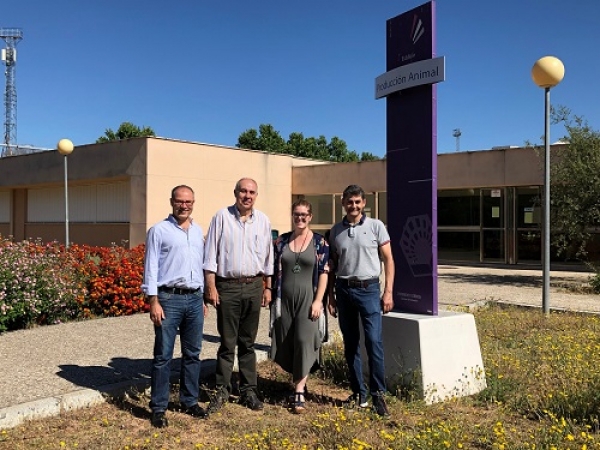A vast landscape dotted by oaks and cork oaks, with a flock of sheep roaming through their pastures, and a group of pigs feeding on acorns. This image, which largely defines what a dehesa is, can be found all across the Spanish southwest, covering some 3.5 million hectares.
It is a unique ecosystem on the Iberian Peninsula, characterised by trees, livestock and pasturelands, mostly used for extensive livestock farming, drawing upon the territory’s natural resources, combining production with sustainability. The dehesa regulates water cycles and soil fertility, promotes biodiversity, and also plays a key role in mitigating climate change through the carbon fixation. Just one hectare of its pastureland assimilates between 30 and 40 tons of CO2.
This ecosystem, which in Sierra Morena encompasses more than 400,000 hectares, protected as a Biosphere Reserve, the largest in Spain, is included in the EU’s "Habitats of European Interest" directive and is, of all the European Union’s Systems of High Natural Value, that which occupies the most extensive surface area. Despite its environmental importance, it is facing a serious crisis, mainly due to the limited profitability of extensive livestock farming compared to intensive livestock systems, where production, at the lowest cost, and in the shortest time possible, prevails.
Averting the decline of this system is the main objective of the PRODEHESA-MONTADO project, a cooperative effort between Spain and Portugal and on which the University of Cordoba is participating through its AGR-195 research group, at its Department of Animal Production.
In order to uphold the value of this type of ecosystem, the project is carrying out an exhaustive study of the "Life Cycle Analysis" of the products generated by dehesas, such as cheese, ham, cork and wool. According to the project’s principal investigator at the UCO, Vicente Rodríguez Estévez, with this technique they are calculating the greenhouse gas emissions generated by the entire production process of these goods, something hitherto not known with any precision.
Although the results are forthcoming, these products’ greenhouse gas emissions are significantly lower than those produced by intensive livestock systems, where most of the emissions and carbon footprint are generated "by the use of fertilizers, plant protection products, energy, and changes in land usage to produce feed".
Knowledge transfer is another of the project’s cornerstones. In this regard, we are researching business models and technologies that are working well in the dehesas of Spain and Portugal, with the aim of bringing them to the attention of the producing community. In addition, another of the project’s aims is the creation of a single regulation for the dehesa by public administrations. According to researcher Vicente Rodríguez, "this ecosystem is affected by a lack of proper administrative classification, which categorises it as permanent pastureland according to the CAP (Common Agricultural Policy) and, erroneously, as a forest area under the Forestry Law, without actually defining it".
Maintaining this type of ecosystem, according to the principal investigator on the UCO project, is "fundamental for all of society". It is an ancient form of land usage, one of the systems boasting the greatest environmental value on the planet, and the last barrier against the desertisation of southern Europe".
Averting the decline of this system is the main objective of the PRODEHESA-MONTADO project, a cooperative effort between Spain and Portugal and on which the University of Cordoba is participating through its AGR-195 research group, at its Department of Animal Production.
In order to uphold the value of this type of ecosystem, the project is carrying out an exhaustive study of the "Life Cycle Analysis" of the products generated by dehesas, such as cheese, ham, cork and wool. According to the project’s principal investigator at the UCO, Vicente Rodríguez Estévez, with this technique they are calculating the greenhouse gas emissions generated by the entire production process of these goods, something hitherto not known with any precision.
Although the results are forthcoming, these products’ greenhouse gas emissions are significantly lower than those produced by intensive livestock systems, where most of the emissions and carbon footprint are generated "by the use of fertilizers, plant protection products, energy, and changes in land usage to produce feed".
Knowledge transfer is another of the project’s cornerstones. In this regard, we are researching business models and technologies that are working well in the dehesas of Spain and Portugal, with the aim of bringing them to the attention of the producing community. In addition, another of the project’s aims is the creation of a single regulation for the dehesa by public administrations. According to researcher Vicente Rodríguez, "this ecosystem is affected by a lack of proper administrative classification, which categorises it as permanent pastureland according to the CAP (Common Agricultural Policy) and, erroneously, as a forest area under the Forestry Law, without actually defining it".
Maintaining this type of ecosystem, according to the principal investigator on the UCO project, is "fundamental for all of society". It is an ancient form of land usage, one of the systems boasting the greatest environmental value on the planet, and the last barrier against the desertisation of southern Europe".
Â


